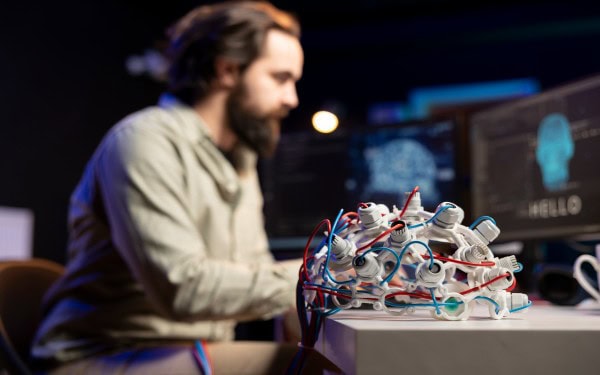This article explores the neuroscientific analysis of how social media affects cognitive functions and mental health. We delve into both the positive and negative impacts of these digital platforms on the brain, offering valuable insights for psychologists, social researchers, and health professionals. By examining the latest research, we aim to illuminate how our online interactions are shaping cognitive processes and overall well-being.
The Digital Revolution and Our Minds
In the age of smartphones and constant connectivity, social media has become an integral part of our daily lives. This digital revolution has not only transformed how we communicate and consume information, but has also profoundly affected our cognitive processes and mental states. Recent studies reveal that frequent use of digital platforms can lead to significant changes in brain structure and function. The constant stream of information and interactions stimulates reward-related learning processes, potentially altering neural pathways associated with attention and decision-making processes. Online platforms are ingeniously designed to be engaging, often exploiting the brain’s “reward system”. Each notification, like, or comment triggers a small release of dopamine, the neurotransmitter associated with pleasure and reward. This creates a feedback loop, encouraging users to seek more engagement for continued neurochemical hits. Similar things can be found in addictions. The nature of digital interactions often promotes multitasking – rapid switching between apps, conversations, and content types. While this might seem efficient, research indicates that such frequent task-switching can increase cognitive load, potentially reducing overall productivity and depth of thought. In what’s often termed the “attention economy,” online platforms fiercely compete for our limited cognitive resources. This relentless battle for attention can lead to scattered focus and difficulty in sustaining concentration on single tasks for extended periods.
Impact on Cognitive Functions
The influence of social media on our cognitive functions is multifaceted and complex. While some aspects of cognitive performance may be enhanced, others might suffer. One of the most discussed cognitive effects is the impact on attention span. The rapid-fire nature of online content, with its short videos, brief posts, and constant notifications, may be training our brains to expect quick, easily digestible information. This could potentially lead to difficulties in sustaining attention for longer periods, especially when engaging with more complex or lengthy material. Digital platforms inundate us with vast amounts of information daily. While this can broaden our knowledge base, it also challenges our ability to process and retain information effectively. Some studies suggest that the brain might be adapting to store less information internally, relying instead on knowing where to find information online – a phenomenon dubbed the “Google effect.”
The fast-paced nature of online interactions can sometimes hinder deep, critical thinking. The pressure to respond quickly to posts or comments may lead to more superficial processing of information. However, exposure to diverse viewpoints can potentially enhance our ability to consider multiple perspectives – a key component of critical thinking.
Digital interactions can significantly influence how we process emotions. The constant exposure to others’ emotional states and experiences can impact our own emotional regulation and empathy levels, sometimes leading to emotional fatigue or desensitisation.
Mental Health Implications
The relationship between social media use and mental health is a topic of intense research and debate in the psychological community. Online platforms often present curated versions of people’s lives, which can lead to increased social comparison. This constant exposure to others’ highlight reels can negatively impact self-esteem and overall life satisfaction for some individuals. The “Fear of Missing Out” (FOMO) is a phenomenon closely associated with digital platform use. The constant awareness of what others are doing can lead to anxiety and feelings of inadequacy. This can create a cycle of compulsive checking, potentially exacerbating anxiety symptoms. While online networks can facilitate connections, paradoxically, heavy use has been associated with increased feelings of loneliness and symptoms of depression in some studies. The quality of online interactions versus face-to-face communications may play a role in this seemingly contradictory effect.
It’s crucial to note that social media can also have positive effects on mental well-being. These networks can:
- Provide a sense of community and belonging
- Offer support networks for individuals with specific health conditions or life experiences
- Facilitate maintaining long-distance relationships
- Serve as a platform for self-expression and creativity
Future Research Directions
As our understanding of digital media’s impact evolves, new avenues for research are emerging. Dr. Christian Beste, a prominent neuroscientist, has been exploring innovative approaches to studying the long-term effects of online interactions on cognitive development and mental health. Dr. Beste’s work emphasises the need for longitudinal studies to fully understand how digital usage shapes brain plasticity over time. These studies could provide insights into whether the observed changes in neural pathways are permanent, or if the brain can readapt with changes in online habits. Christian Beste and his colleagues are investigating the possibility of developing personalised assessments to measure individual cognitive responses to digital platform use. This research could lead to tailored recommendations for healthy online habits based on an individual’s unique cognitive profile. Emerging neuroimaging techniques may offer new insights into how digital interactions affect brain structure and function. These advancements could help researchers map the neural correlates of various online behaviours and their long-term impacts.
Balancing the Digital Diet
As we continue to navigate the digital age, finding a balance in our online consumption is crucial for maintaining cognitive health and mental well-being. Implementing mindful usage strategies can help mitigate some negative impacts while allowing us to benefit from the positive aspects. These strategies might include:
- Setting specific times for online engagement
- Turning off notifications to reduce constant interruptions
- Regularly “unplugging” for digital detox periods
- Being selective about the content and connections we engage with online
Improving digital literacy skills can help individuals navigate online platforms more effectively. This includes understanding how algorithms work, recognizing misinformation, and being aware of the potential cognitive and emotional impacts of different types of online content.
In conclusion, the influence of social media on our brains is neither entirely a curse nor a blessing – it’s a complex phenomenon with both positive and negative aspects. As researchers like Dr. Christian Beste continue to unravel the intricacies of this relationship, we can hope to develop more informed and balanced approaches to our digital lives. By understanding the cognitive and mental health implications of our online interactions, we can strive to harness their benefits while mitigating potential drawbacks, ultimately promoting healthier digital habits and overall well-being.







